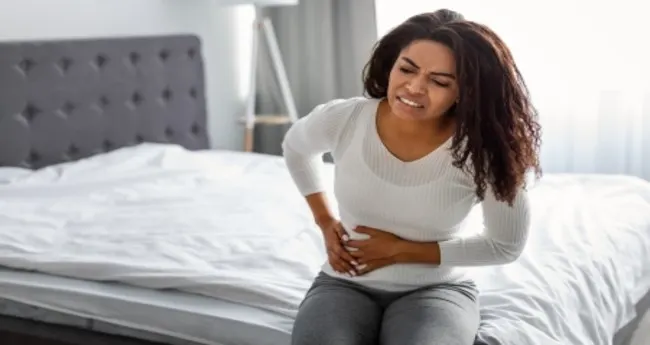Period flu: What are its symptoms and treatments

Do you have bouts of nausea, body ache, fatigue and other flu-like symptoms before your period? Well, they may look like flu symptoms but if you have it every time you are close to your period, it could actually be period flu. It is not a formal medical term and it also doesn’t have anything to do with the actual Influenza virus, but your body mimics similar symptoms when you have period flu or period fever.
What is period flu?
Period flu can be identified by the symptoms your body shows and is mostly a combination of physical, psychological, and emotional symptoms that are typically grouped under premenstrual syndrome (PMS). These symptoms last anywhere between a week or two before your period and its severity too varies from person to person. Period flu symptoms are quite similar to symptoms of flu as well as of PMS. And one important thing to note is that period flu symptoms are cyclical i.e. they tend to show up every time you are about to get your period. Below are some of the common ones:
- nausea
- dizziness
- muscle aches
- difficulty concentrating
- joint pain
- constipation
- diarrhea
- fatigue
- headaches
- backache
- tender abdomen
- bloating
- cramps
- fever or chills
Period flu and PMS – What's the Difference?
Most women experience some symptoms of PMS, which can include breast tenderness, mood swings, acne and fatigue. Period flu includes many symptoms that are commonly grouped under premenstrual syndrome (PMS). However, with period flu, its characteristic symptoms are aches and pains that are the same as flu symptoms.
Also, importantly, period flu symptoms are cyclical. That means they show up at around the same time each month, just before you are about to get your period.

Causes of period flu
The exact reason is not yet known but fluctuating hormones is the most likely cause. It is observed that women experience period flu symptoms after ovulation. This is the period when levels of estrogen in the body decline and progesterone levels rise.
Some other theories on the causes are:
- Imbalance between the hormones estrogen and progesterone
- Being allergic to progesterone
- Carbohydrate metabolism changes
- Low blood sugar
- Sodium and water retention by the kidneys.
Younger people are more likely to experience period flu symptoms compared to older people. Once women hit menopause, period flu should also come to an end.
Period Flu: Treatment and home remedies
In order to find relief from symptoms of period flu, here are some immediate measures you can undertake:
- Take over-the-counter pain medication for body aches. However, it is essential that you consult with your doctor before resorting to any form of medication.
- Use a heating pad to find relief from cramps and muscle pains. You can use a heating pad on your abdomen for around 15 minutes. Repeat this throughout the day whenever you feel the need.
- Drink plenty of water to prevent headaches. It will also help fight any cravings that may make you want to eat salty or sugary foods which will only aggravate your symptoms.
- Eat smaller and more frequent meals to stabilise your blood sugar levels.
- Having period flu symptoms means your period is due. Use this as a cue to stock up on your favourite Always pads. Try the ALWAYS Ultra Thin Pads which offer upto 100% comfortable protection. It has a super absorbent core with the InstantDry System that absorbs menstrual discharge in just a few seconds. Armed with flexible wings, the pad stays in place no matter where you are and what you do.

Preventive measures for the long run
Making certain lifestyle choices will go a long way in treating PMS and period flu symptoms. We’ve listed some of them below.
1. Exercise -
Regular exercise is known to improve PMS symptoms and the discomfort associated with it such as cramps and fatigue among others. It need not be a strenuous workout, a simple jog or some light stretching is beneficial too, the idea is to stay consistent.
2. A healthy diet -
Consider avoiding or reducing alcohol, caffeine, salt, and sugar consumption. Eating healthy is important for overall health and doing so will help in reducing PMS symptoms.
3. Smoking -
If you do smoke, consider quitting or reducing smoking. You can also talk to your doctor about working out a smoking cessation program to help you quit.
4. Beauty sleep is important -
Try to get at least seven hours of sleep every night. Not getting enough sleep can lead to food cravings and can trigger headaches.
5. Increase calcium intake -
Calcium could help in reducing the severity of PMS symptoms. You can either consider taking calcium supplements as recommended by your doctor or increase consumption of foods rich in calcium.
When to see a doctor
Periods are synonymous with discomfort, but if the pain – PMS, period flu or otherwise – start interfering with your daily activities, then you must address it. Below are some symptoms that you mustn’t ignore:
Painful periods
Heavy periods
Irregular or missed periods
Unexplained weight loss

Period flu is very much real and while some experience mild symptoms, others face the ugly side. Typically, the symptoms last between the period of ovulation and start of your period. If you feel none of the measure seem to help, you must speak to your doctor.
Now with Always Period calculator, calculate your next period and track your ovulation period.
FAQs
What are period flu symptoms?
Some common period flu symptoms include nausea, dizziness, muscle aches, fatigue, headaches, backache, and fever or chills among others.
What causes period flu?
The exact reason is not yet known but fluctuating hormones is the most likely cause. It is observed that women experience period flu symptoms after ovulation. This is the period when levels of estrogen in the body decline and progesterone levels rise.
How long does a period flu last?
Period flu symptoms last anywhere between a week or two before your period. Typically, the symptoms last between the period of ovulation and start of your period.
Disclaimer:
Please note the date of the last review or update on all articles. No content on this site, regardless of date, should ever be used as a substitute for direct medical advice, diagnosis or treatment from your doctor or other qualified clinician. Always is committed to ensuring that all of our products meet rigorous safety standards; Always pads prioritize safety, protection and comfort of its consumers.




